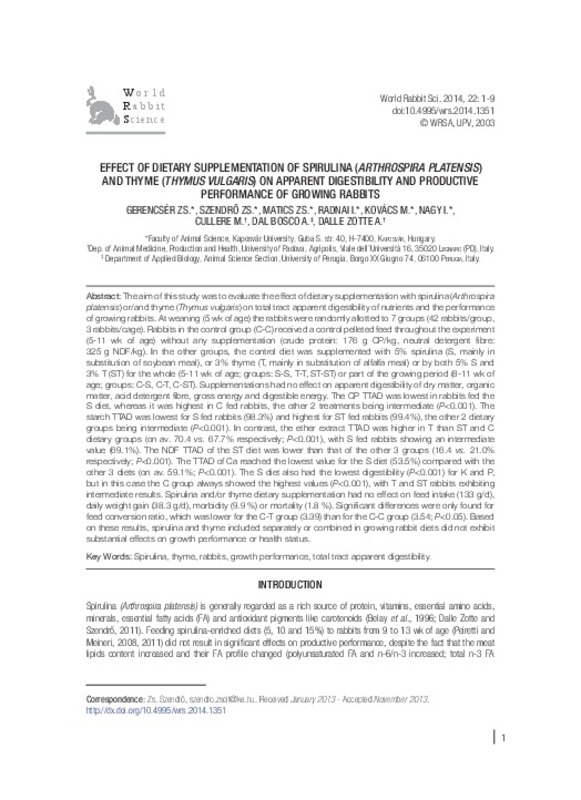JavaScript is disabled for your browser. Some features of this site may not work without it.
Buscar en RiuNet
Listar
Mi cuenta
Estadísticas
Ayuda RiuNet
Admin. UPV
Effect of dietary supplementation of spirulina (Arthrospira platensis) and thyme (Thymus vulgaris) on apparent digestibility and productive performance of growing rabbits
Mostrar el registro completo del ítem
Gerencsér, Z.; Szendro, Z.; Matics, Z.; Radnai, I.; Kovács, M.; Nagy, I.; Cullere, M.... (2014). Effect of dietary supplementation of spirulina (Arthrospira platensis) and thyme (Thymus vulgaris) on apparent digestibility and productive performance of growing rabbits. World Rabbit Science. 22(1):1-9. https://doi.org/10.4995/wrs.2014.1351
Por favor, use este identificador para citar o enlazar este ítem: http://hdl.handle.net/10251/39050
Ficheros en el ítem
Metadatos del ítem
| Título: | Effect of dietary supplementation of spirulina (Arthrospira platensis) and thyme (Thymus vulgaris) on apparent digestibility and productive performance of growing rabbits | |
| Autor: | Gerencsér, Zsolt Szendro, Zsolt Matics, Zsolt Radnai, István Kovács, Melinda Nagy, István Cullere, Marco Dal Bosco, Alessandro Dalle Zotte, Antonella | |
| Fecha difusión: |
|
|
| Resumen: |
[EN] The aim of this study was to evaluate the effect of dietary supplementation with spirulina (Arthrospira platensis) or/and thyme (Thymus vulgaris) on total tract apparent digestibility of nutrients and the performance ...[+]
|
|
| Palabras clave: |
|
|
| Derechos de uso: | Reserva de todos los derechos | |
| Fuente: |
|
|
| DOI: |
|
|
| Editorial: |
|
|
| Versión del editor: | https://doi.org/10.4995/wrs.2014.1351 | |
| Código del Proyecto: |
|
|
| Agradecimientos: |
|
|
| Tipo: |
|








